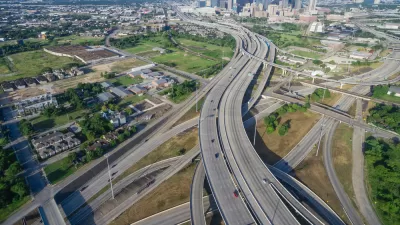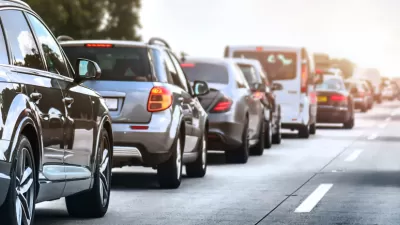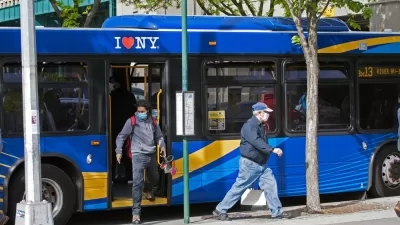Mobility as a Service (MaaS) relies on technology to streamline transportation and improve access. But apps are not going to be enough for people to leave their cars behind.

David Zipper takes a closer look at Mobility as a Service (MaaS) and its potential to shift people from driving to other more sustainable modes. "Boosters of the concept hail it as a means of weaning commuters off privately owned automobiles via technology platforms that allow them to easily book and plan trips across an array of urban transportation services—including transit, bikeshare, ride hail, e-scooters, and more."
The goal is admirable, says Zipper, but he challenges the notion that technology is a mobility solution more than just a tool. Apps can help travelers navigate transportation systems, but they cannot create accessible and robust mobility networks. For that, policy and planning need to address service and infrastructure issues.
Increased transit frequency, improved biking infrastructure, and higher driving costs provide incentives for people to look to alternatives to auto use. MaaS can bring a variety of modes together onto one platform, says Zipper. "But we should be realistic: Without supportive policies and investment decisions, the smartest MaaS technology in the world won’t be able to liberate cities from our reliance on automobility."
FULL STORY: There’s No App for Getting People Out of Their Cars

Alabama: Trump Terminates Settlements for Black Communities Harmed By Raw Sewage
Trump deemed the landmark civil rights agreement “illegal DEI and environmental justice policy.”

Study: Maui’s Plan to Convert Vacation Rentals to Long-Term Housing Could Cause Nearly $1 Billion Economic Loss
The plan would reduce visitor accommodation by 25% resulting in 1,900 jobs lost.

Why Should We Subsidize Public Transportation?
Many public transit agencies face financial stress due to rising costs, declining fare revenue, and declining subsidies. Transit advocates must provide a strong business case for increasing public transit funding.

Wind Energy on the Rise Despite Federal Policy Reversal
The Trump administration is revoking federal support for renewable energy, but demand for new projects continues unabated.

Passengers Flock to Caltrain After Electrification
The new electric trains are running faster and more reliably, leading to strong ridership growth on the Bay Area rail system.

Texas Churches Rally Behind ‘Yes in God’s Back Yard’ Legislation
Religious leaders want the state to reduce zoning regulations to streamline leasing church-owned land to housing developers.
Urban Design for Planners 1: Software Tools
This six-course series explores essential urban design concepts using open source software and equips planners with the tools they need to participate fully in the urban design process.
Planning for Universal Design
Learn the tools for implementing Universal Design in planning regulations.
Caltrans
Smith Gee Studio
Institute for Housing and Urban Development Studies (IHS)
City of Grandview
Harvard GSD Executive Education
Toledo-Lucas County Plan Commissions
Salt Lake City
NYU Wagner Graduate School of Public Service





























